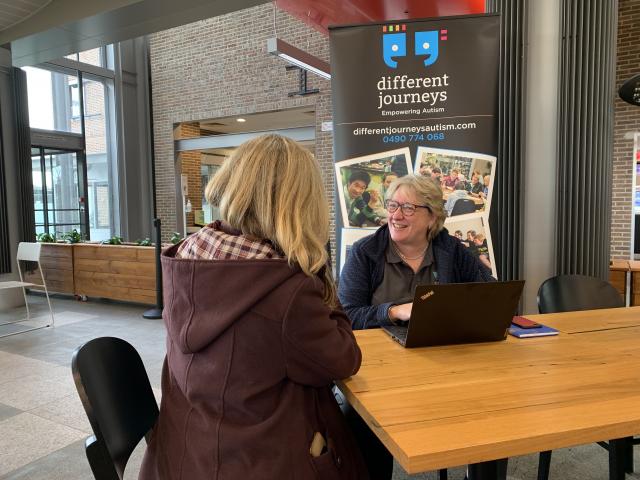The federal government has released the National Autism Strategy and an associated Action Plan for the first time at the commonwealth level.
The strategy and the action plan aim to improve inclusion, support and life outcomes for all autistic Australians, focusing on four key outcome areas; social inclusion, economic inclusion, diagnosis, services and supports, and health and mental health.
Different Journeys co-founder and chief executive officer Mel Spencer OAM said she welcomed the unified approach to the National Autism Strategy because each state currently has different processes and rules, which makes it confusing for the autistic community.
“A nationally consistent approach will help us all understand what supports are available, how to access and why the need is important,” she said.
“It will also help us bring to the forefront more of the same challenges many of us are experiencing in isolation. Nationally, this will make our voices stronger.”
Different Journeys provides peer support and social connection for the autistic and unpaid carer communities based in Outer East.
It’s been nine years since Different Journeys started its journey to support people with autism and their families.
“I am autistic and ADHD and am a parent and a carer for my three autistic children who also have complex mental health challenges,” the co-founder said.
“We started it because we were not receiving the services we needed for our own children, so we decided to create something.”
Ms Spencer said there are many challenges that are often not talked about such as finding support and navigating complicated service systems to access that.
“Autism is a whole life condition; we are across all life spans and access to community, but people are often putting us in the disability sector, and there is much work to be done in the intersectionality and comorbidity space, particularly autism and mental health,” she said.
“We work with over 10,000 families in Victoria at a grassroots level but have recently had to cut our services because of funding cuts. Finding funding for our services continues to be a challenge.
“96 per cent of our staff are either autistic or carers of autistic individuals. Not only do we have lived experience but also knowledge and experience about how to access support and services.
“For many, even just getting through the education system can be so traumatic.”
The first action plan is backed by $42.3 million in funding and outlines the practical steps the federal government will take to achieve the vision and outcomes of the strategy over the next two years.
One of the key investments in the first action plan is going towards peer support as the government has promised to invest $19.9 million over four years for a peer support program to provide lived-experience knowledge, empathy and culturally tailored advice for autistic people in groups they resonate with.
Ms Spencer said having peer support is important in supporting autistic and unpaid carer communities.
“The lived experience is so powerful as often if you are trying to navigate this space, someone that has walked the journey beforehand is essential. You can feel so alone and isolated but finding someone else who can share and understand your journey makes you feel that little bit less alone,” she said.
“We need to ensure with peer support that not only do we have lived experience, but we also know how to access and support others with the complicated service systems, because we also have lived it.
“There is a lot of talk about lived experience/peer support but you need to be able to know how to access support and services. It’s not enough just to say ‘I’m autistic’. No one person is the same and we need to ensure that many voices are heard.”
Other than investing for a peer sport program, the first phase of the strategy also aims to enhance community understanding, awareness and acceptance of autism through $915,000 over two years for new awareness and education initiatives; to improve the diagnosis process through $445,000 in 2025-26 for resources to support autistic people and their families with pre- and post-diagnosis information; to boost pathways to meaningful employment through $915,000 over two years to improve employment opportunities and support for autistic people; to invest $12.2 million over five years for a dedicated knowledge translation body, which will ensure academic research into neurodiversity informs and improves the policies and services impacting autistic people’s lives day to day; to invest $3.7 million over two years to work with autistic people and the autism community to evaluate existing programs aiming to improve their lives, to identify what works, where there are gaps and opportunities for improvement; to identify ways to improve Australian Government services, supports, information and the safety and welfare of autistic people; and to invest $2.8 million over four years for a comprehensive epidemiological study to identify the true prevalence of autism in Australia, which will underpin future policy development.
The Different Journeys co-founder said she would like to see investment in supporting families through the National Autism Strategy.
“I think education, employment, diagnosis and mental health are great topics, but we also need to bring families on the journey with us. Often the families are just as lost in trying to support the autistic individual,” Ms Spencer said.
“I would like to see investment in supporting families to support the autistic individual. This is what Different Journeys does.
“We support the family which in turn supports the autistic individual and allows every member to thrive. Together we have an opportunity to make important changes that can support everyone in the chain.”
The seven-year strategy was developed with the guidance of the National Autism Strategy Oversight Council and involved extensive consultation with autistic people, their families and carers, and the broader autism and disability sectors, researchers and experts.
Federal social services minister Amanda Rishworth said the new strategy reflects the government’s vision for a more inclusive Australia where all people with disability are supported to participate in all spheres of life.
“Our Labor Government is committed to improving the lives of the almost 300,000 autistic people living in Australia and it’s why we have delivered the first National Autism Strategy,” minister Rishworth said.
“Addressing the barriers autistic people face in areas like education, employment and diagnosis is long overdue and we are proud to deliver a strategy that will change lives for the better.
“This is not a strategy that has been done in isolation. It has been built in consultation and collaboration with autistic people living in Australia.
“Working with autistic people will remain key as we work to implement the goals of the strategy and the associated action plan – ensuring we meet the diverse needs of autistic people in Australia.”







